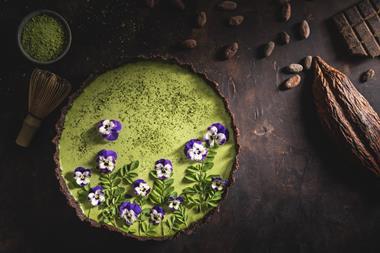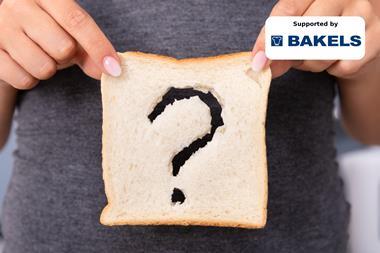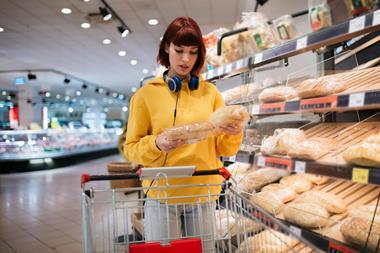Bakers looking to tap the burgeoning vegan trend face technical challenges – not least of which is replicating the properties of egg in recipes.
Veganism: a trend so prevalent it warranted its own episode on the latest series of The Great British Bake Off – and also brought the launch of a vegan sausage roll from a certain high street food-to-go retailer.
Six hundred thousand Brits are now vegan, according to The Vegan Society, and the number is growing fast – with 43% making the change in 2018.
One hurdle bakers face when looking to tap this growth is creating baked products that don’t contain dairy fats. These can be replaced by water- and plant-based oil emulsions, such as margarine and shortening, while nut or legume-based ‘milk’ can be used in place of animal milk.
However, bakers must ensure alternatives are suitable for vegans, warns Paul Maxwell, trade marketing manager at Aryzta Food Solutions, adding that some margarines contain Vitamin D3 which isn’t suitable for vegans, and that some E-numbers, such as E422 and E72a-f, come from animal sources.
Arguably, however, the biggest challenge is replacing egg and the properties it brings, such as structure, texture, colour and taste.
Options for replacing egg whites in products such as meringues, include aquafaba (the water in which chickpeas have been cooked), and a combination of chia or flax seeds with water. But, as the GBBO contestants demonstrated last summer, using aquafaba as the base for a meringue can take time to perfect.
“Once you’ve got your technique down to a fine art, and have achieved the perfect mix of lightness and chewiness, you should be able to produce perfect vegan meringues every time,” adds Maxwell.
Given the challenges of vegan baking, it’s little surprise that ingredients manufacturers offer solutions.
“The biggest consideration bakers have when developing vegan products is finding the right formulations and ingredients to deliver all of same functional properties of egg,” says Robert Lambert, marketing and communications at Ulrick & Short.
His firm recently developed Ovaprox V, described as a total egg replacement for cakes. The product has been designed to mimic the functionality of egg in regards to volume, crumb structure, texture and bite.
Also creating ingredients for vegan bakery is Puratos, which last month launched vegan Satin cake mixes in chocolate and plain flavours, using an egg alternative created by its research and development team. The manufacturer is now planning to launch a vegan scone mix.
“Vegan consumers should have the right to delicious patisserie and bakery products without any compromise on taste and texture,” says Puratos UK R&D patisserie manager Olivia Creber.
She adds that creating mixes suitable for a vegan diet can be challenging, particularly for patisserie products that use egg for texture, volume stability, colour and flavour.
Ingredients manufacturer Macphie unveiled a range of vegan-certified mixes on last year’s World Vegan Day (1 November). Available in plain and chocolate flavours, the mixes underwent an intense audit process to become vegan-certified.
Next month, Bakels is to launch Multimix Vegan Cake Complete that it says will require only the addition of water and oil, and will enable bakers to seamlessly add vegan products to their offering.
“In a category suffering from a reputation for being unhealthy, cake goods can benefit from an injection of vegan options, helped by the perceived healthier image coupled with positive ethical credentials,” says Bakels marketing manager Michael Schofield.
With ongoing development in specialist mixes and ingredients, vegan bakery looks set to continue growing.
Case Study: Vegan vendors
While bakers are increasingly adding a few vegan items to their menus, some businesses have fully committed to the lifestyle and launched exclusively vegan stores.
Crosstown Doughnuts, for example, opened an exclusively vegan bricks-and-mortar site in London’s Marylebone last March.
“Having an exclusively vegan store allows us to offer customers a comfortable experience,” says Adam Wills, director and co-founder at Crosstown. “Every aspect of the shop is vegan-compliant; we’ve removed the leather straps from the aprons, we offer a full selection of suitable drinks and, in many cases, customers will be served by vegan staff who are just as passionate as they are.”
Before opening, the doughnut business had offered vegan doughnuts at its existing sites, which now sell four or five vegan options, while the vegan store has a range of nine. It also attends markets with its full vegan range.
Glasgow bakery Rawnchy has been vegan from the outset, with founder Poppy Murricane starting with a market stall before opening a shop and wholesale business.
“People respond fantastically to the fact Rawnchy is 100% vegan,” says Murricane. “Vegans and people with allergens are so grateful to have a place that they can come and be safe in the knowledge that they can choose any one of our products and it will be suitable for them.”
Rawnchy is also frequented by those who aren’t following a vegan or gluten-free diet, with Murricane explaining that, often, customers don’t realise the bakes are free-from until they are told.
Surrey-based Coughlans Bakery boasts a 90% vegan offering, and introduces at least one new vegan product each week to keep customers interested.
Director Sean Coughlan says transitioning to a majority vegan offering hasn’t been plain sailing, but he’s very proud of the move.
“Not everything has worked first time, some recipes have taken months to get right,” he adds.
On avoiding cross-contamination with the few non-vegan products on-site, Coughlan explains: “This is very straightforward, but also critical. We make everything by hand in different areas of production. The staff are fully trained to inform customers of our vegan range and they use separate utensils.”





























No comments yet